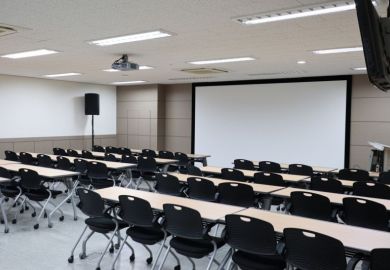A University of Oxford professor committed a “serious instance of research misconduct” when she failed to properly acknowledge the work of Chinese collaborators in her award-winning book, according to an investigation by the institution.
Anna Lora-Wainwright, professor of the human geography of China at Oxford, was awarded the 2018 British Sociological Association/Thinking Allowed Ethnography Award for Resigned Activism: Living with Pollution in Rural China, which was based, in part, on her time spent living alongside people suffering from health problems linked to pollution.
However, collaborators complained that Professor Lora-Wainwright “failed to make clear the collaborative nature and co-production of much of the work”, and failed to consult colleagues about her use of their research, according to an internal Oxford report seen by Times Higher Education.
Professor Lora-Wainwright acknowledged that she had “played no role in designing or conducting the research” for one chapter on villages affected by high rates of cancer, said complainants Jennifer Holdaway and Wang Wuyi, directors of the Forum on Health Environment and Development (Forhead).
Of the 25-page chapter, 14 pages consisted of summaries of a 2013 paper by Ajiang Chen of Hohai University, with other pages drawing on a 2016 paper co-authored by him and Professor Lora-Wainwright, the complainants alleged.
A three-person panel rejected Professor Lora-Wainwright’s claim that the acknowledgements in a methodology section at the back of the book gave sufficient credit to colleagues. It also criticised her “description of Professor Chen’s and his team’s work [which] tends to emphasise the fieldwork done by them…without giving sufficient credit to [their] analysis”.
Other Chinese scholars’ intellectual contributions were also largely overlooked, the investigation concluded. Li Liping, a professor at Shantou University Medical College, recruited students as interviewers, paid for their travel and labour costs with university funds and interviewed local health workers herself while working with Professor Lora-Wainwright. However, she said she was “shocked” to see that Resigned Activism “appeared to include Professor Li’s and her students’ work without explaining that it was not all Professor Lora-Wainwright’s work”, the report says.
The Oxford professor contended, according to the report, that she made only a “brief reference” to these interviews in the chapter, which focused on her “own detailed accounts of visits” to the village and interviews conducted personally.
Professor Lora-Wainwright told THE that she “believed at the time of publication that I had adequately consulted collaborators and acknowledged their contributions in the book. Any insufficient acknowledgement was entirely unintentional,” she said.
The panel concluded that, while Professor Lora-Wainwright “did not intend to deceive or mislead”, her approach was “characterised by carelessness and a lack of due diligence with regard to the intellectual contribution of others”. It found that she had “committed misconduct in research by the unacknowledged appropriation of the work of others and by misrepresentation of involvement in a research project”.
Although the complainants called for the book, published by MIT Press, to be recalled and the prize rescinded, the panel instead recommended that the acknowledgements be amended in the online version, and for Professor Lora-Wainwright to be assigned an academic mentor.
That sanction was branded “totally unacceptable” by five Chinese professors in a letter to Gillian Aitken, the university’s registrar. The five – professors Wang, Chen and Li, plus Jing Fang and Shiqiu Zhang – called on Professor Lora-Wainwright to make a full public apology and for the university to “take away the rewards and position that [she] received based on the book”.
They also questioned the “underlying cause” for the lack of redress by Oxford, asking: “Is this because the victims of this misconduct are Chinese scholars?”
“We certainly think there is a double standard here and that things would be different if the collaborators were from Europe or the US,” Professor Wang told THE.
An Oxford spokesman said that it took “allegations of research misconduct very seriously” but noted that the panel concluded Professor Lora-Wainwright did not set out to deceive. “The university is confident that policies on academic integrity have been applied as they would be in any case, and the action taken was robust and appropriate to the circumstances,” he added.
Register to continue
Why register?
- Registration is free and only takes a moment
- Once registered, you can read 3 articles a month
- Sign up for our newsletter
Subscribe
Or subscribe for unlimited access to:
- Unlimited access to news, views, insights & reviews
- Digital editions
- Digital access to THE’s university and college rankings analysis
Already registered or a current subscriber?








